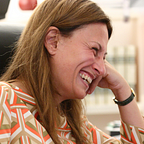Gender equality and creativity: crossing paths
My analysis about creative and cultural industries will be among the cases discussed at the 2015 event of the Women’s Empowerment Principles at the UN
The road to gender equality passes through Italy and heads to the United Nation: this week I will take part to the annual event of the Women’s Empowerment Principles, where also Hillary Rodham Clinton and Ban Ki-moon will chime in.
Creating law to break the rules, the analysis presented by my law firm, will be among the case histories of the meeting, which will take place on March 10th and 11th and will be held as part of the official CSW59/Beijing+20 programme (and you can also download it here).
The one I run is — proudly, but also a bit inexplicably — the only italian law firm to have subscribed the Women’s Empowerment Principles, along with a handful of national companies. To me, this is just another factor helping to point out quite clearly that, also when it comes to business, there is still a lot of work to be done to achieve gender equality. And this is why, as a lawyer, I feel the responsibility to step in and do my part.
The document accepted as a case history at the WEPs is part of my contribution to the cause: our research aims at defining to what extent a legal environment providing equal opportunities and rights for women and men coincides with a more creative setting. The results we have achieved so far show that there is a positive association between creativity and laws supporting gender equality, and we have already been given proof of that: we all remember what had happened in the United States during the Nineties, when new laws on family and medical leave, or combating violence against women, went along with an outburst of creativity. This was true especially in music: riot grrrls, anyone?
I have been dealing with laws for creativity for a long time — starting in 2012 with Rio+20 (when my case stood out as one of the european best practices) and then subscribing one of the related projects of the Piano Strategico Metropolitano in Bologna — but my commitment is very far from coming to an end: the document accepted at the WEPs in still a work in progress.
We expect to see the final results of the first part of our research only in december 2015, and we will present them during a big event that we will organise in Bologna along with the International Human Solidarity Day.
Stay tuned…
